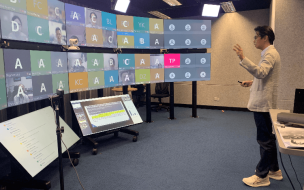When COVID-19 hit, the airline industry ground to a halt. Cancelled flights, dropping passenger numbers, and huge hits to revenue. The International Air Transport Association (IATA) estimates that globally between January and December 2020, overall seat capacity will be down 51-52%, passenger numbers will be down by nearly three billion, and revenue loss could hit $400 billion.
Part-Time MBA graduate from the Hong Kong University of Science and Technology (HKUST) Business School, Aldric Chau, believes that top MBA talent can help aid travel and other industries’ recovery post-pandemic.
He’s the head of retail, e-commerce, and travel partnerships for Cathay Pacific Airways, and has seen first-hand the impact COVID-19 has had on the industry. Digital transformation will become unavoidable for airlines as they reinvent their business models in the years to come, to modernize and deal with the fallout from the pandemic.
COVID-19 and the challenges facing the airline industry
COVID-19 means airlines can’t act in the same way they did in the past, and Aldric thinks it’s an opportunity for introducing step changes in the entire ecosystem.
“We need to think how we use digital tools to optimize the company going forward,” he explains. To maintain growth and adapt to the new economy, MBA graduates skilled in technology will be a top priority.
Aldric’s MBA at HKUST equipped him with the skills to solve complex business problems and adapt to a challenging environment, as well as the business jargon to work across departments. That meant when COVID-19 hit he was ready to act.

Whilst airlines’ passenger business took a huge hit when the pandemic hit, there are still opportunities in cargo and other parts of our operation, Aldric explains—“We had to be very agile and innovate, for example, we’ve started using the passenger cabins of our Boeing 777-300ERs to help transport medical supplies and meet the increased demand for airfreight.
“It has always been important to be knowledgeable in tech and to use that as a tool to sustain and grow our business, but I think after COVID-19 the pandemic has accelerated all types of business transformation.
“Businesses still relying on offline transactions, manual processes, and a brick and mortar business model have to change and adapt in order to survive in a COVID-19 environment.”
The benefits of the HKUST MBA
The HKUST MBA has developed since Aldric graduated into an MBA for the new era of business and tech.
A pre-MBA accelerator course teaches students Python programming; the school gives students the opportunity to deep dive into topics like artificial intelligence, big data, the Internet of Things (IoT), and fintech; and a new business technology and analytics career path leads students into the world of tech after graduating.
Aldric explains the MBA doesn’t just teach you the theory but backs up your education with case studies so managers can take the technical knowledge and use it in their organizations.
Because of HKUST’s academic focus on science and technology, there is also an overlap in the courses—faculty have balanced industry and research expertise. Professor Mordecai Golin, for example, has a PhD from Princeton University and his research focuses on the design and analysis of algorithms, computational geometry, and information theory.
Aldric also studied consulting skills for managers and was taught by Chris Doran, an ex-McKinsey consultant.
“We learned to better structure our thought process so when we’re tackling problems, even though the solution might not be the same each time, the thought process is the same, and is data and insights driven,” he says.
HKUST is focused on building a partnership with their students to give them the exposure, business knowledge, network, and platform to develop their career.
Every full-time MBA student from the cohort entering in 2020 will have a personalized academic advisor, and a career advisor. The MBA students work with their career coach to identify their career goals and how to reach them. The academic advisor helps each student tailor their curriculum to match their career aspirations—MBA students have over 70 flexible cores and electives to pick from.
The partnership Aldric built with HKUST allowed him to thrive post-MBA and deliver on digital transformation objectives for Cathay Pacific.
Student Reviews
HKUST Business School








